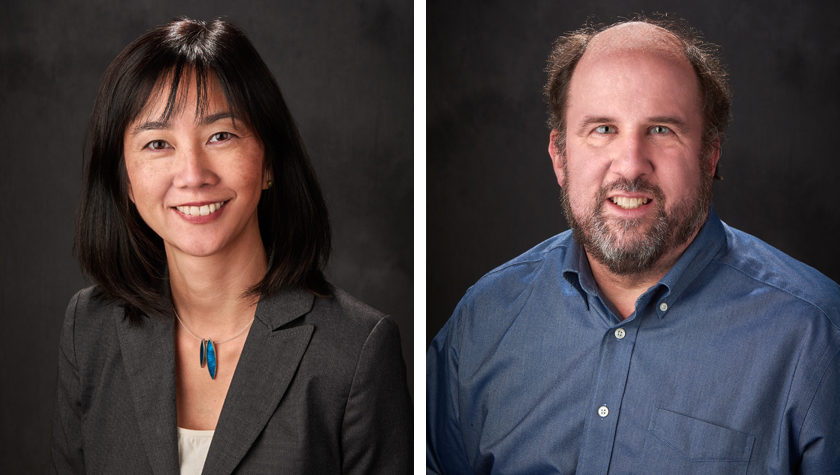Alum Anaïs Webster Mennuti combines a career in hospital pharmacy with her creative passions in film and writing
By Jessica Steinhoff
At the end of the 2015–16 academic year, each student graduating from the University of Wisconsin–Madison School of Pharmacy’s PharmD program received a study aid for the Multistate Pharmacy Jurisprudence Exam. The accompanying CD contained tables comparing pharmacy laws in all 50 states.
Anaïs Webster Mennuti (PharmD ’16) was excited to explore this resource as she prepared for licensure. Then she realized her laptop lacked a CD drive.
“That got me thinking: There’s probably tons of information sitting on old storage devices that can’t be accessed — information that’s simply lost to time, but we don’t notice because technology moves so fast,” she says.
She played with this idea the summer after graduation, outlining different scenarios about technology management gone wrong. What might happen if we lost access to our history, or if the tech controlling parts of our daily lives broke? A science fiction story emerged from the what-ifs.
“We want patients and pharmacists to feel empowered.”
—Anaïs Webster Mennuti
“A group of characters gets disconnected from their implanted technology, and they no longer have access to food, water, or electricity because, to their surprise, all of that was controlled by their implants,” she explains.
Her pharmacy career soon took center stage, so she put the novel-length manuscript in a drawer.
“I’ve grown a lot as a writer since I started working on it, so it needs a major overhaul,” she explains, “but I’d like to publish it one day.”
The interplay between her ingenuity and pharmacy education sparked a creative journey that continues to the present.
The path to pharmacy
In her youth, Webster Mennuti imagined her grown-up self in a health care career. As a young child, she yearned to become a veterinarian, and in adolescence, she aspired to become a physician. She started college on a biomedical engineering track, intending to go to medical school. As Webster Mennuti gained independence, she also gained self-insight: Engineering wasn’t a great fit for her, and neither was medical school.

Then she heard about pharmacy.
“Pharmacy was still in health care, I got to help people, and it seemed like a stable job,” she says. “I got along well with other pre-pharmacy students in my classes and figured that if I like them now, I’ll like them later as colleagues.”
While earning her PharmD at the School of Pharmacy, Webster Mennuti worked as a technician and later an intern at a local Walgreens, translating classroom knowledge into a retail pharmacy environment. After graduation, she spent five years working as a pharmacist and pharmacy manager with Walmart, relocating to Eugene, Oregon, in 2018. The next year, she accepted a hospital pharmacist role that allowed her to work evenings and stay home with her baby during the day.
A prescription for empowerment
One of Webster Mennuti’s creative projects is an in-the-works documentary, “Harmacy.” Along with a companion book, the film will show the challenges she sees that pharmacists in many chain environments face and the implications for patient safety, and present the case for systemic reform. She and her production team have conducted more than 100 interviews with potential subjects, crowdfunded $70,000, and discussed the project on a dozen podcasts, including NPR’s “1A” and Pharmacy Times’ “Pharmacy Focus.”
Webster Mennuti, the film’s director, writer, and producer, says the COVID-19 pandemic exacerbated many systemic problems affecting retail pharmacy workers and the patients they serve.
“I tend to seek out ways to improve systems and processes whenever I practice as a pharmacist, and I believe that’s because the creative part of my brain is an out-of-the-box thinker and sees opportunities,” she says.
She adds that one goal of the film is to clear up misconceptions that patients have about what’s going on behind the pharmacy counter at the drugstore. Retail pharmacies often don’t have the resources to provide exactly what patients are expecting, she says, which can create confusion and disappointment.
“Pharmacies really committed to immunizing the public during COVID-19, but sometimes there weren’t enough staff to do the job. Patients didn’t understand what was happening or why,” Webster Mennuti says. “Pharmacists need to be resourced appropriately so they can serve the public.”

The film and book take a closer look at some of the larger forces at play, such as how patients’ health insurers often pay independent pharmacies significantly less than the cost of their prescriptions. When this happens, these pharmacies struggle to maintain resources, such as staffing, which negatively impacts both pharmacists and patient care, says Webster Mennuti.
Systemic problems with many sources are tough to tackle, but her three-woman production team, which includes a fellow pharmacist and a business exec in the independent pharmacy space, think knowledge and passion can make a dent.
“We want patients and pharmacists to feel empowered,” Webster Mennuti says. “You can use that feeling in many ways, whether it’s by waiting calmly in line at the pharmacy or writing to your congressperson or pushing for change on the corporate side.”
The next steps for “Harmacy” are connecting with Hollywood movers and shakers, which has started to happen, as well as finding investors, creating an official roadmap for the story, finishing the filming and editing, and then distributing and marketing the final product.
“Since we have already done so much pre-work, like recording hundreds of hours of Zoom footage, we think we’re about a year to 18 months from the finish line. That’s a blistering pace for the film industry,” Webster Mennuti says.
Books and beyond
When Webster Mennuti switched to her hospital pharmacy job at PeaceHealth, she also switched to a part-time schedule so she could work on two novel manuscripts and bond with her new daughter. She’d begun writing screenplays during her pregnancy, too, and found it refreshing.
“I wanted to make space for that creativity in my life while making sure I was a good partner and parent and staying mentally healthy,” she says. “I knew there’s always the opportunity to pick up more shifts at work.”
“What keeps me inspired is that I truly love being a creative person. It brings me joy.”
—Anaïs Webster Mennuti
Currently, Webster Mennuti is cowriting two screenplays with disparate vibes: the sparkly “Christmas in July” and the horror-laced “Baaaaaby.” She’s also drafting a novel exploring a fascinating scenario: Everyone in a society is required to work a customer service job for some time, after which they are sent to an island for the kindest souls or the mainland where everyone else resides.
Even with time carved out for creative work, the daily balancing act can be difficult.
“What keeps me inspired is that I truly love being a creative person,” she says. “It brings me joy.”

